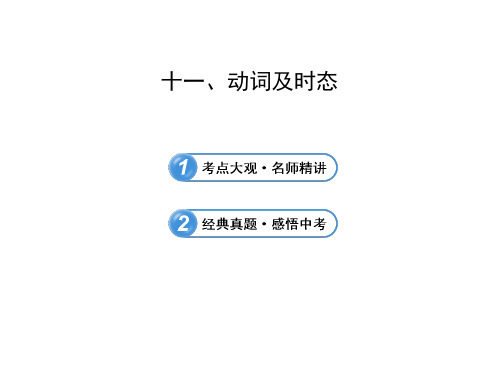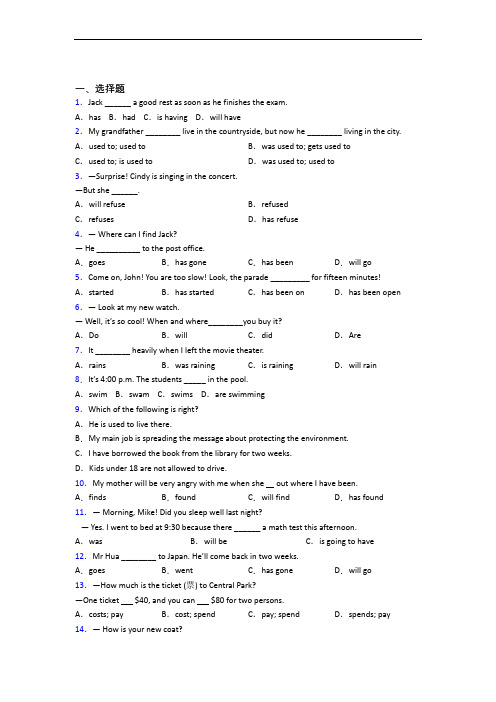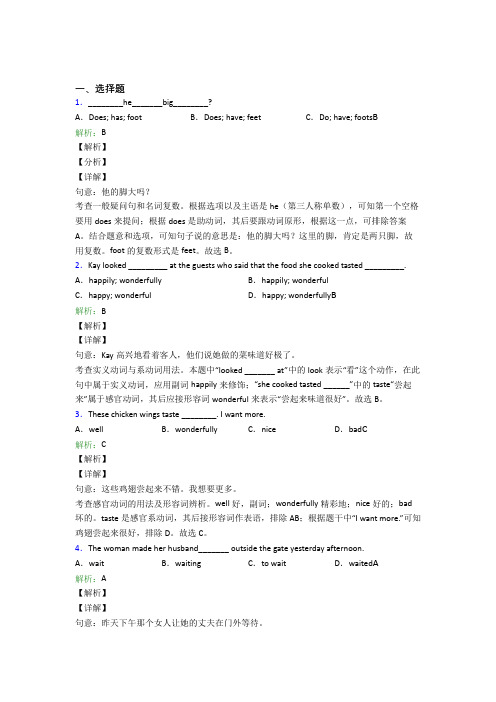初中英语语法 动词时态基础专项
初中英语语法动词及时态ppt课件

过去进行时 主语+was/were+v. -ing+其他
现在完成时 主语+have/has+过去分词+其他
中学阶段见到的其他时态 时态
构成
过去完成时 主语+had+过去分词+其他
过去将来时
现在完成 进行时
主语+would+动词原形+其他 主语+was/were going to+动词原形
主语+have/has+been+现在分词+其他
状语
【温馨提示】
(1)在含有时间状语从句的复合句中,延续时间较长的动作用过 去进行时,另一个短暂性动作用一般过去时。例如:
My pen dropped on the ground when I was walking in the park. 在公园散步的时候,我的钢笔掉到地上了。
(2)表示两个延续性动作在过去某一时刻同时进行,不考虑动作 的先后顺序,主句和从句的谓语动词都用过去进行时,连词常 用while。例如:
词
宾语,又分为及物动词和 不及物动词。
物动 run , walk , cry , 词 swim,fall,happen
连
系 连接主语和表示主语身份、be , seem , look , become ,
动
性质、状态的动词称为连 get , grow , feel , appear ,
系动词。
turn
day等频率副词或时间状语 month.
连用
我们每月都去看望刘叔叔。
用法
例句
表示客观事实或普遍真理 The sun rises in the east. 太阳在东方升起。
初中英语时态总结知识点

初中英语时态总结知识点一、一般现在时一般现在时表示经常发生的动作或现在存在的状态。
它由主语+动词原形构成,第三人称单数的动词要加-es或-s后缀。
例句:1. I brush my teeth every morning.2. She goes to school by bus.二、现在进行时现在进行时表示正在进行的动作,由主语+be动词(am/is/are)+动词-ing形式构成。
例句:1. He is reading a book right now.2. We are studying for the math test.三、一般过去时一般过去时表示过去某个时间发生的动作或存在的状态,规则动词后加-ed,不规则动词需记忆其过去式形式。
例句:1. They played soccer yesterday.2. I walked to the library last week.四、过去进行时过去进行时表示过去某个时间点正在进行的动作,由主语+be动词的过去式(was/were)+动词-ing形式构成。
例句:1. She was watching TV when I called her.2. They were working on the project all night.五、一般将来时一般将来时表示将来会发生的动作或状态,由主语+will+动词原形构成。
例句:1. I will travel to Japan next year.2. He will start a new job next month.六、将来进行时将来进行时表示将来某个时间点正在进行的动作,由主语+will be+动词-ing形式构成。
例句:1. He will be working at this time tomorrow.2. They will be studying for the exam next weekend.七、现在完成时现在完成时表示过去发生的动作对现在造成的影响或结果,或从过去开始一直持续到现在的动作,由主语+have/has+动词的过去分词构成。
石家庄市初中英语语法知识—动词时态的知识点总复习附答案解析

一、选择题1.Jack ______ a good rest as soon as he finishes the exam.A.has B.had C.is having D.will have2.My grandfather ________ live in the countryside, but now he ________ living in the city. A.used to; used to B.was used to; gets used toC.used to; is used to D.was used to; used to3.—Surprise! Cindy is singing in the concert.—But she ______.A.will refuse B.refusedC.refuses D.has refuse4.— Where can I find Jack?— He __________ to the post office.A.goes B.has gone C.has been D.will go 5.Come on, John! You are too slow! Look, the parade _________ for fifteen minutes! A.started B.has started C.has been on D.has been open 6.— Look at my new watch.—Well, it’s so cool! When and where________you buy it?A.Do B.will C.did D.Are7.It ________ heavily when I left the movie theater.A.rains B.was raining C.is raining D.will rain 8.It’s 4:00 p.m. The students _____ in the pool.A.swim B.swam C.swims D.are swimming9.Which of the following is right?A.He is used to live there.B.My main job is spreading the message about protecting the environment.C.I have borrowed the book from the library for two weeks.D.Kids under 18 are not allowed to drive.10.My mother will be very angry with me when she out where I have been.A.finds B.found C.will find D.has found 11.— Morning, Mike! Did you sleep well last night?— Yes. I went to bed at 9:30 because there ______ a math test this afternoon.A.was B.will be C.is going to have 12.Mr Hua ________ to Japan. He’ll come back in two weeks.A.goes B.went C.has gone D.will go 13.—How much is the ticket (票) to Central Park?—One ticket $40, and you can $80 for two persons.A.costs; pay B.cost; spend C.pay; spend D.spends; pay 14.— How is your new coat?— Well, I __________ it on and it fits me well.A.try B.tried C.have tried D.had tried 15.He _______ to school by bike, but now he _____ to school on foot.A.used to going, gets used to goingB.used to go, gets used to goC.used to go, gets used to going16.Look! Dave __________ on the phone.A.talks B.are talking C.talk D.is talking 17.—I can’t find Peter. Where is he?— He ______ tea in the living room.A.drinks B.drinking C.is drinking D.drink 18.While I_______ a detective story, someone_______ at the door.A.read, was knockingB.read, knockedC.was reading, knockedD.was reading, was knocking19.It’s 8 o’clock. The students _________ an English class.A.have B.having C.is having D.are having 20.—How did the accident happen?—You know, it was difficult to see the road clearly because it________.A.was raining B.has rained C.is raining D.will rain 21.— What do you use MP3 for?— I ________ it ________ to music.A.use; listen B.are listening; listeningC.use; to listen D.is listening; to listening22.The restaurant ________ many complaints because of the terrible service since last month. A.receives B.is receiving C.has received D.will receive 23.My father is a teacher and he ___________ in this school for about twenty years. A.works B.is working C.was working D.has worked 24.----Can you tell me how long you_______ the Huawei mobile phone,Mr. Zhang.----Nearly a year. It works very well.A.will buy B.have had C.have bought D.had had25.—I'm sorry. There was too much traffic on the road.—Never mind. The meeting________for only 5 minutes.A.has begun B.has stopped C.has been on【参考答案】***试卷处理标记,请不要删除1.D解析:D【解析】句意:Jack一完成他的考试就要好好的休息一下。
初中七年级英语常用语法知识——动词时态知识点总结(培优专题)

一、选择题1.________he_______big________?A.Does; has; foot B.Does; have; feet C.Do; have; foots B解析:B【解析】【分析】【详解】句意:他的脚大吗?考查一般疑问句和名词复数。
根据选项以及主语是he(第三人称单数),可知第一个空格要用does来提问;根据does是助动词,其后要跟动词原形,根据这一点,可排除答案A。
结合题意和选项,可知句子说的意思是:他的脚大吗?这里的脚,肯定是两只脚,故用复数。
foot的复数形式是feet。
故选B。
2.Kay looked _________ at the guests who said that the food she cooked tasted _________. A.happily; wonderfully B.happily; wonderfulC.happy; wonderful D.happy; wonderfully B解析:B【解析】【详解】句意:Kay高兴地看着客人,他们说她做的菜味道好极了。
考查实义动词与系动词用法。
本题中“looked _______ at”中的look表示“看”这个动作,在此句中属于实义动词,应用副词happily来修饰;“she cooked tasted ______”中的taste“尝起来”属于感官动词,其后应接形容词wonderful来表示“尝起来味道很好”。
故选B。
3.These chicken wings taste ________. I want more.A.well B.wonderfully C.nice D.bad C解析:C【解析】【详解】句意:这些鸡翅尝起来不错。
我想要更多。
考查感官动词的用法及形容词辨析。
well好,副词;wonderfully精彩地;nice好的;bad 坏的。
taste是感官系动词,其后接形容词作表语,排除AB;根据题干中“I want more.”可知鸡翅尝起来很好,排除D。
初中英语语法动词八种时态详解现在进行时

初中英语语法现在进行时基本结构现在进行时由 am/is/are 加现在分词构成。
例句: They’re having a meeting. 他们在开会。
I’m studying at an evening school. 我在上夜校。
Mike is coming home on Thursday. 迈克星期四回来。
They’re having a party next week. 下星期他们将开一个晚会。
You’re always interrupting me! 你老打断我的话!(抱怨)My father is always losing his car keys. 我爸老丢车钥匙。
(不满)She’s always helping people. 她老是帮助别人。
(赞扬)初中英语语法动词八种时态详解:现在进行时主要用来描述“说话、写文章的当刻”正在发生的动作,或是“现阶段”一直在进行的动作。
它适用于下面的情况:1)“说话、写文章的当刻”正在发生的动作。
例如:They are having a football match .他们正在赛足球。
She is writing her term paper. 她正在写学期论文。
Someone is asking for you on the phone. 有人找你听电话。
2)“现阶段”一直在进行的动作。
这种情况并不是说某个动作在说话的那会儿正在发生,而是说某个动作在当前一段时间内一直在进行着,或是重复地发生着。
例如: He is preparing for CET B and Six. 他在为大学英语六级考试作准备。
How are you getting along with your new job?你那份新工作干得怎么样?3)表示说话人的情感,如:赞许、批评;喜欢、厌恶等。
这时的动作并不是正在发生或进行,而是表示经常性,相当于“一般现在时”所描述的情况。
中考英语语法:动词时态

动词时态●动词时态●一般现在时【形式】I / We / You / They doHe / She / It does【意义】【功能】1.表示经常性的动作或状态e.g. I live in Shanghai.2.表示习惯性的动作或状态e.g. He always drink coffee in the morning.3.表示客观真理e.g. The sun rises in the east.【常见关键词】频度副词: always, usually, often, sometimes, seldom, rarely, never 表示频率的短语: once a week, twice a year, every day, every week●现在进行时【形式】I am doingWe / You / They are doingHe / She / It is doing【意义】【功能】1.表示现在正在进行或现阶段正在进行的动作e.g. I'm learning English with Fiona.I am reading this book these days.【常见关键词】now, at present, at the moment, for the time beinglook, listen, be careful【辨析】一般现在时vs现在进行时一般现在时:强调过去现在将来都如此的一贯性现在进行时:强调动作的暂时性(目前如此)I don't really work here. I ______ until the new secretary arrives.A) just help outB) have just helped outC) am just helping outD) will just help out●现在完成时【形式】I / We / You / They have doneHe / She / It has done【意义】【功能】1.动作从过去开始一直持续到现在,现在仍在进行并还有可能延续下去e.g. We have known each other for 7 years since I moved here.2.动作在过去完成,并对现在产生影响,影响一直持续到现在e.g. Where have you put the book? I can't see it anywhere.【常见关键词】Already(用于肯定句中), yet(用于否定句和疑问句中), just, since(自从), for+一段时间, recently, ever, never, by now, so far, in the past few years, in the last ten weeks注意:1)在完成时句中,与for, since, how long连用时,动词要用延续形式。
最新初中英语语法知识—动词时态的知识点总复习含答案解析(2)
一、选择题1.Don’t turn on the TV. Grandma ________.A.sleeps B.is sleeping C.sleep D.are sleeping 2.—Mom, can you teach me how to pronounce the words?—Wait a minute. I ________.A.am cooking B.cookC.cooked D.will cook3.— Look at my new watch.—Well, it’s so cool! When and where________you buy it?A.Do B.will C.did D.Are4.It ________ heavily when I left the movie theater.A.rains B.was raining C.is raining D.will rain 5.It’s 4:00 p.m. The students _____ in the pool.A.swim B.swam C.swims D.are swimming6.—I called you at three yesterday afternoon, but you weren’t in.—I ________ a meeting at that time.A.had B.was having C.have had D.would have 7.—How much is the ticket (票) to Central Park?—One ticket $40, and you can $80 for two persons.A.costs; pay B.cost; spend C.pay; spend D.spends; pay 8.My mother when I got home yesterday.A.will cook B.cooks C.has cooked D.was cooking9.--Look! Someone the classroom.--Well,it wasn't me. I didn't do it.A.is cleaning B.was cleaning C.has cleaned D.will clean 10.If Tina _____ at home tomorrow, I _____ her.A.is staying, will visit B.stays, will visit C.will stay, visit 11.He _______ to school by bike, but now he _____ to school on foot.A.used to going, gets used to goingB.used to go, gets used to goC.used to go, gets used to going12.—Rose, can you give me a hand?—Just a minute. I ______ the followers.A.am watering B.have wateredC.watered D.water13.Look at Amy. She ________ for the school bus.A.wait B.is waiting C.waits D.waiting 14.— Have you ever been anywhere for a trip?— A trip? I ________ away from my hometown even once.A.went B.have gone C.have been D.have never been 15.The water ______ cool when I jumped into the pool for morning exercise.A.was felt B.is felt C.felt D.feels 16.While I_______ a detective story, someone_______ at the door.A.read, was knockingB.read, knockedC.was reading, knockedD.was reading, was knocking17.--What age did you leave home ?--I left home at 18. I ___your city for five yearsA.have gone to B.have been to C.have been in D.have come to 18.The film Operation Red Sea_____a lot of praise since its first show months ago. A.wins B.win C.will win D.has won 19.It’s 8 o’clock. The students _________ an English class.A.have B.having C.is having D.are having 20.—Did you hear the strange noise next door around 9 o’clock last night?— No, I ________my favourite film in my bedroom.A.watch B.watched C.am watching D.was watching 21.Don’t talk! The baby ________.A.sleeps B.is sleep C.sleeping D.is sleeping 22.— What do you use MP3 for?— I ________ it ________ to music.A.use; listen B.are listening; listeningC.use; to listen D.is listening; to listening23.My father was reading ________ I was sleeping.A.while B.when C.before D.after 24.Look! All my classmates ___________ on the playground.A.are running B.ran C.were running D.run25.—I can’t find Peter. Where is he?— He ______ tea in the living room.A.drinks B.drinking C.is drinking D.drink【参考答案】***试卷处理标记,请不要删除一、选择题1.B【解析】【分析】【详解】句意:别开电视,奶奶正在睡觉。
英语语法专项突破(动词的时态和语态)超实用,特别推荐
第五节动词的时态和语态考点一时态1.一般现在时(1)表示现在的状态以及经常性或习惯性的动作。
He often gets up at six in the morning.他经常早上6点起床。
(2)表示不受时间限制的客观事实或普遍真理。
As we know,light travels faster than sound.众所周知,光比声音传播得快。
(3)在时间、条件或让步状语从句中,常用一般现在时表示将来。
As long as it doesn't rain tomorrow,we'll have a trip on schedule.只要明天不下雨,我们就按原计划旅行。
[名师点津]常用来表示按时间表、时刻表、日程表等安排将要发生的动作,只限于表示起止的动词如go,come,arrive,leave,start,fly,return等。
The live football match starts at 9 o'clock this evening.足球实况转播今晚9点钟开始。
2.一般过去时(1)表示过去的事情、动作或状态,常与表示过去的时间状语连用。
Long long ago,there was a war between birds and beasts.很久很久以前,鸟类和兽类发生过一场战争。
(2)表示说话人原来没有料到、想到的事。
I didn't know you were here.How long have you been here?我不知道你在这里,你来了多久了?3.一般将来时(1)表示将来的动作或状态常用will/shall+动词原形;表示临时做出的决定用will+动词原形。
—The light is still on.——灯还亮着。
—Sorry,I'll go and turn it off.——很抱歉,我这就去关掉。
(2)be going to表示按计划、打算要做某事,此外,还可以表示根据现在的迹象对未来做出判断。
初中英语语法八种时态详解与练习
初中英语语法:八种时态详解与练习一.概念:英语中表示不同时间发生的动作或存在的状态,需用不同的动词形式表示,这种不同的动词形式称为时态。
二.种类:(基本时态)一般现在时一般过去时现在进行时过去进行时一般将来时过去将来时现在完成时过去完成时一般现在时一、概念:经常、反复发生的动作或行为及现在的某种状况。
二、常搭配的时间状语:always, usually, often, sometimes, every week (day, year, month?), once a week, on Sundays, etc.三、基本结构①be动词(is,am,are);②行为动词(主语是第三人称单数时谓语动词要加s或es 外)否定形式:①am/is/are+not;②此时态的谓语动词若为行为动词,则在其前加don't,如主语为第三人称单数,则用doesn't,同时还原行为动词。
一般疑问句:①把be动词放于句首;②用助动词do提问,如主语为第三人称单数,则用does,同时,还原行为动词。
例句:I go to school at 6 every morning. 每天早上我七点去上学。
Summer follows spring. 春天之后是夏天。
I learned that the earth goes around the sun when I was in primary school. 我在小学就学过地球是围绕太阳转的。
Pride goes before a fall. 骄者必败。
四、基本用法:1) 描述当前时间内经常出现、反复发生的动作或存在的状态。
在这种情景中,句子常带有表示频率的时间状语:always , everyday , often , once a week (month , year , etc.) , sometimes , seldom , usually等等,以表示句中的动作或状态是习惯性的、经常性的。
初中英语动词时态
❖ My brother and I gost,ox,scsho, ochl f后ro读m/Miz/onday to Friday.
动词的现在分词的构成
1. 一般加-ing; work---working
2. 以不发音的e结尾的词去e,加-ing; live---living
3. 以重读闭音节结尾,末尾只有一个 辅音字母的词,要双写该辅音字母, 再加-ing;stop---stopping
need 中
need + sth. need to do sth. We need more chairs. We need to plant more trees. 2.情态动词:放在疑问句和否定句中 You needn’t do it in such a hurry
助动词
❖ 协助主要动词构成谓语的动词叫 助动词,它对谓语动词起辅助作 用。被协助的词叫主要动词。助 动词本身没有含义,不可单独使 用。
词序 1 主语
2谓语
3 宾语
即句子的主体 是句子中的必不 动作、行为的对象, 可少的成分,说 是动作的承受者 明主语的动作
词性 名词;代词
实意动词Do
名词;代词;不定式 或相当于名词的词、
短语
基本句型2
❖ 状语的位置 1.孩子们玩游戏。 The children played games. 2.孩子们安静地玩游戏。 The children played games quietly. 3.孩子们在他们的房间里安静地玩游戏。 The children played games quietly in their room. 4.孩子们今天早上在他们的房间里安静地玩游戏。 The children played games quietly in their room this morning. 中文习惯于先交代时间和地点,但英语中状语往往放在主
- 1、下载文档前请自行甄别文档内容的完整性,平台不提供额外的编辑、内容补充、找答案等附加服务。
- 2、"仅部分预览"的文档,不可在线预览部分如存在完整性等问题,可反馈申请退款(可完整预览的文档不适用该条件!)。
- 3、如文档侵犯您的权益,请联系客服反馈,我们会尽快为您处理(人工客服工作时间:9:00-18:30)。
师大教育 用心的教育 http://kehou.org 1 初中英语动词时态基础练习 1.I will tell him as soon as he _____ back A. come B. comes C. will come D. came 2. Mary _____ on shoes when she ____ them. A. tries…buys B. tries… buies C. trys… buys D. trys… buies 3. The girl often ______ cold when she ______. A. cathcs…dances B. catches… dances C. catchs…dancees D. catches… dancee 4. _____ he ____ himself there? No, I don't think so. A. Do…enjoy B. Does… enjoies C. Does… enjoys D. Does…enjoy 5. _____ your teacher ____ from them very often? Certainly. A. Do…hear B. Does…hear C. Do… receive D. receive 6. _____ your mother _____ some cleaning on Sundays? A. Does…does B. Do…does C. Does…do D. Do… do 7. _____ Tom _____to work hard to help his family ? Yes, he _____. A. Has… x…does B. Has…x…does C. Does…has…has D. Does… have…does 8. Which teacher _____ lessons to you every day ? A. does …gives B. does… give C. do… give D. gives 9. Smith does not go fishing on weekdays, ____? _____ , he does A. does he…No B. does he…Yes C. doesn't he…No D. doesn't he…Yes 10.Mr Black often _____ fishing on Sundays, _____ he ? A. goes…doesn't B. goes…isn't C. doesn't go…does D. doesn't go…is 11.He usually _____ TV on Sunday evening. A. watch B. watches C. watching D. is watching 12. We'll go to play with snow if it ______ tomorrow. A. snow B. snows C. will snow D. snowed 13. Neither I nor he ______ French. A. speak B. doesn't speak C. speaks D. doesn't speak 14. Nobody ______ how to run this machines. A . know B. have known C. knows D. is knowing 15. The Young Pioneer _____ water for the old man every day. A. carry B. bring C. takes D. carries 16. Some are ______ in the river and some are ______ games. 师大教育 用心的教育 http://kehou.org 2 A. swimming… playing B. swimming…plaiing C. swimming… I playing D. swimming…plaing 17. Look ! The boy students are _____ football while the girls are _____ . A. playing… dance B. playing… dancing C. play… dancing D. play… dance 18. He _____ to do his lessons at eight every evening. A. is beginning B. is beginning C. begin D. begins 19. _____ he _____ on well with his friends this term ? A. Does…gets B. Does…get C. Is…getting D. Is…geting 20. Mr Smith _____ short stories, but he ____ a TV play these days. A. is writing…is writing B. is writing… writes C. writes… is writing D. writes… writes 21. I _____ to the cinema. I ______ there every Sunday. A. go…go B. am going… go C. go… am going D. am going…am going 22. Look, they______ a good time, ____ they ? A. have…do B. have…don't C. are having…are D. are having… aren't 23. You ______ about the future now, ______ you ? A. don't think…don't B. aren't thinking… aren't C. don't think… do D. aren't thinking… are 24. She always ______ something whenever she ______. A .studied…played B. studied…plaied C.. studied…plaied D. studied… played 25. He often _____ late in the forest. It _____ me very much., A. stayed…worried B. staied… worried C. stayed…worryed D. staied… worried 26. I ______that the boy _____ with no tears in his eyes. A. noticed… cryed B. noticed… cried C. noticed…cried D. noticed… cryed 27. We _____the floor and _____ all the windows. A. mopped… cleanned B. moped… cleaned C. mopped…cleaned D. moped… cleaned 28. When I _____ the Children's Palace, the children _____ with joy. A. visited… jumpped B. visited… jumped C. visited… jumped D. visited… jumpped 师大教育 用心的教育 http://kehou.org 3 29. ______ a sports meet last Sunday ? Yes , they ______. A. Did they have… did B. Did they have… had C. Had they… had D. Had they… did 30. ____ you _____out for a walk after supper ? Yes, I ______. A. Did…went…went B. Did… go… went C. Did… went… did D. Did… go… did 31. _____ Jack _____ on with his work or ______ to have a rest? A. Did… went… stopped B. Did… go… stop C. Did… went… stop D. Did… go… stopped 32. You gave them a talk two days ago, _____you ? Yes, I ______. A. did… did B. did… gave C. didn't… did D. didn't… gave 33. ____ your broth er _____ a letter to ? My father. A. Who… wrote B. What…wrote C. Who did…write D. What did… write 34. They _____ about the TV news then in the sitting-room. They often ____ such talks A. talked…had B. talk…have C. were talking…had D. are talking…have 35. He ______ some cooking at that time, so _____ me. A. did… heard B. did… didn't hear C. was doing… heard D. was doing… didn't hear 36. " _____ you angry then?" "They_ too much noise.” A. Are…were making B. Were…were making C. Are…made D. Were… made 37. This time yesterday Jack _____ his, bike. He _____ TV. A. repaired… didn't watch B. was repairing… watched C. repaired… watched D. was repairing… wasn't watching 38. We _____ for Tom at ten last Sunday. He often kept us ______. A. were waiting… waiting B. were waiting… wait C. waited… waiting D. waited… wait 39. When you _____ at the door, I _____ some washing. A. knocked… did B. was knocking… did C. knocked… was doing D. knock… am doing 40. The boy_____ English on the radio when I _____ his door. A. learned… was opening B. was learning… opened C. learned… opened D. is learning… open
